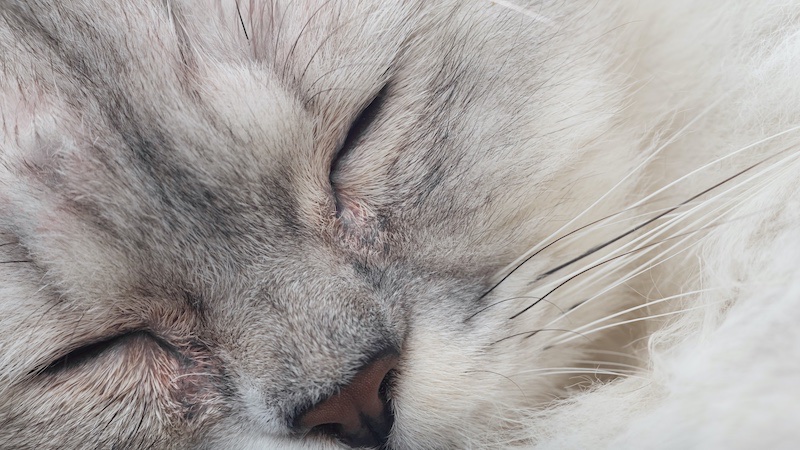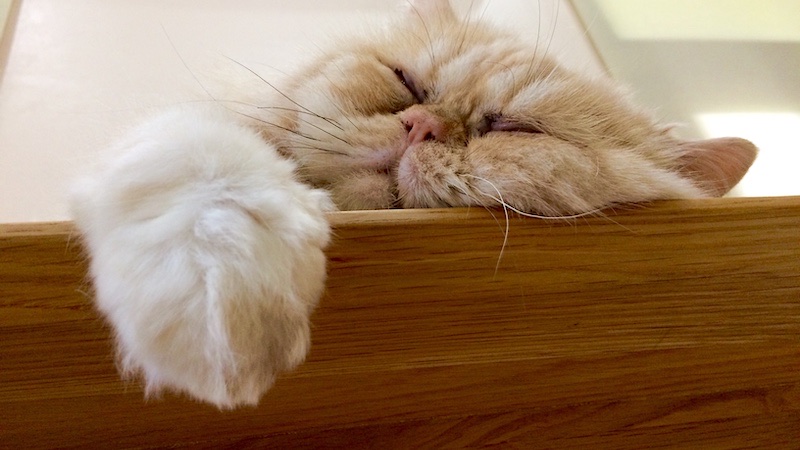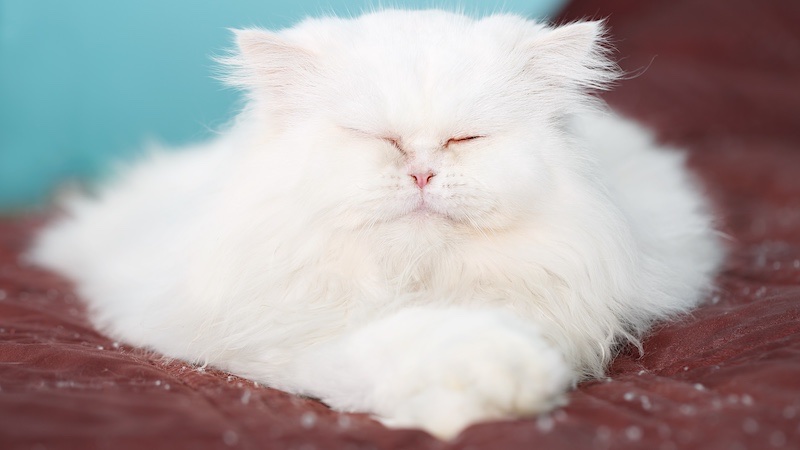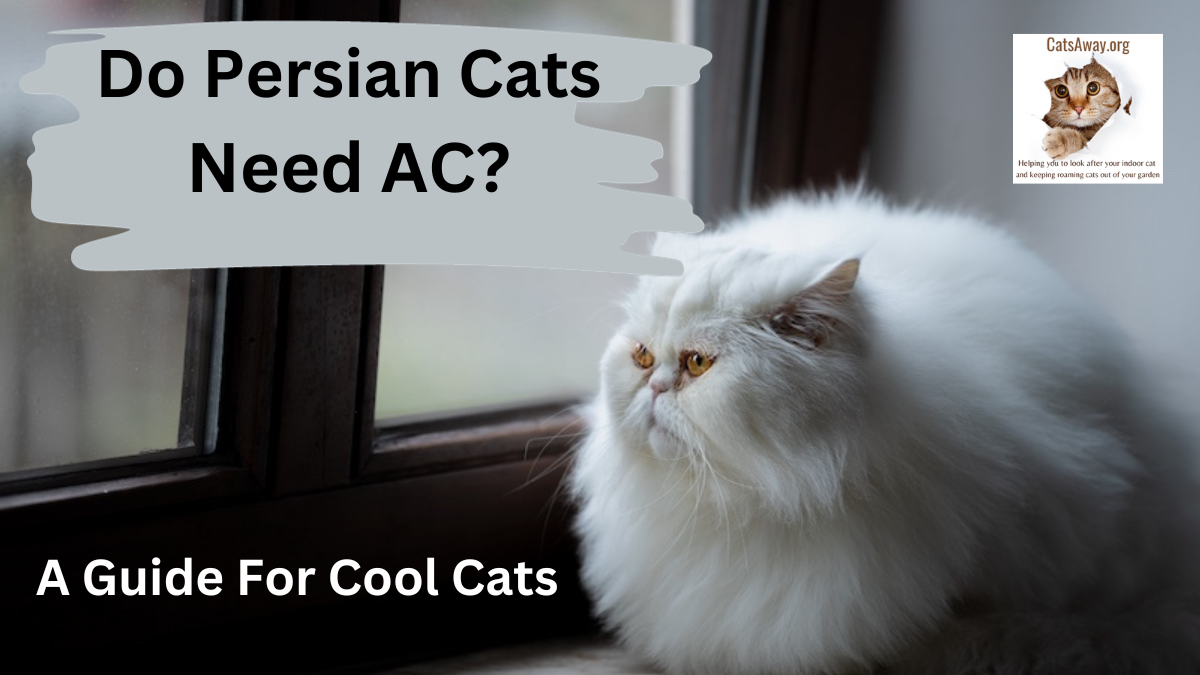Persian cats are best known for their laid-back personalities, making them a popular choice as an indoor cat. Owners may notice that their Persian cat is often sleeping, leading to curiosity about what causes their feline friend to be so snoozy.
Why is my Persian cat always sleeping? Several factors influence a Persian cats sleep habits, such as their environment, age, and even genetics but it could also be an underlying factor that something is not right and any significant change in your Persian cat’s sleeping patterns may well justify a visit to the vet.
In this article, we will explore those factors and provide insight into why your Persian cat sleeps so much. Armed with this knowledge, as responsible cat owners you can better understand your pet’s behavior and recognize when to seek professional advice.
Normal Sleep Patterns of Indoor Persian Cats
Crepuscular Activity
As well as their lush coat and laid back personalities, Persians are also known for their distinct sleep patterns. They are crepuscular creatures, meaning they are most active during the twilight hours of dawn and dusk. This is a trait shared by many cat breeds and is related to their natural instincts to hunt and be active during these peak times.
Cat Nap
Persian cats, like other felines, take frequent cat naps throughout the day. On average, a cat sleeps about 2.8 hours resting and 7.8 hours napping per day. These short naps help them conserve energy while still allowing them to maintain alertness and be ready for any sudden movements or potential threats.
Short naps: 2.8 hours
Longer naps: 7.8 hours
Deep Sleep
In addition to cat naps, Persian cats also experience a deeper sleep phase. They typically sleep for 12 to 16 hours a day, with some reaching up to 20 hours depending on their age and health.
Kittens and senior cats tend to sleep longer compared to those in their prime years. During this deep sleep stage, they are less responsive to external stimuli and are fully recharging their energy levels.
Overall, it’s essential to recognize and understand your Persian cat’s normal sleeping pattern. Being aware of their daily routine will help you determine if any changes occur that may indicate a health issue or other concerns.
Factors Affecting Why Cats Sleep So Much

Age
A cat sleeps more as they age and their activity levels decrease. Older Persian cats, like any other senior cats may experience age-related issues that can lead to an increase in sleep.
Environment
A cat’s environment is essential in determining the quality and duration of sleep. A comfortable and quiet space encourages Persian cats to sleep more peacefully. Disturbances, loud noises, or an uncomfortable environment can lead to disrupted their sleep pattern.
Weather
Weather conditions can also impact a cat’s sleep even if they’re full time indoor cats. Colder temperatures in the house may cause Persians to sleep more as they conserve their energy to stay warm, while hotter temperatures can result in a restless sleep due to discomfort.
Stress and Anxiety
Stress and anxiety in a Persian cat can lead to irregular sleep. Identifying and addressing the causes of stress, such as the introduction of a new pet into the household, can help improve their sleep quality.
Lifestyle and Diet
Persian cats’ lifestyle and diet also significantly influence their sleep. Cats on a diet designed specifically for indoor cats and that have regular exercise are more likely to have a healthy sleep pattern.
All overweight cats may experience difficulty sleeping, not just Persian cats, leading them to sleep more or be unable to find a comfortable position.

Genetics
Most domesticated cats fall into sleep schedules like their human family and this often happens with Persians. However, the Persian cat is one of the oldest cat breeds on the planet and there are records of them dating back as far as 1620. It’s not uncommon for them to fall into a routine more inline with their ancestors than other domestic cats.
Their ancestors would hunt all night and then fall asleep during the day. When a cat does a lot of day sleeping it can be simply that they are hard wired to do so.
In summary, a Persian cat’s sleep can be affected by factors like age, environment, weather, stress and anxiety, as well as lifestyle and diet. Providing a comfortable, stress-free environment and a balanced lifestyle will help ensure your Persian cat gets the rest they need.
Underlying Health Issues
Arthritis and Mobility
Arthritis is a common issue for older cats, which can cause pain and limit their mobility. Cats sleep to provide relief from the discomfort to conserve energy. A veterinarian can prescribe medications to manage the pain and inflammation, potentially improving the cat’s activity level.
Sleep Apnea
Persians are predisposed to Brachycephalic Airway Syndrome due to their flat faces. This condition can lead to sleep apnea, which causes noisy breathing, coughing, and interrupted sleep.
In severe cases, a vet may recommend medications or surgical interventions to alleviate airway obstructions and improve sleep quality.
Diabetes
Diabetes can also contribute to an increased need for sleep in cats. Symptoms include increased thirst and urination, weight loss, and lethargy. Proper management, such as insulin therapy, may help improve your cat’s energy levels.
Always consult your vet if you suspect your cat is showing signs of diabetes.
Hyperthyroidism
Cats with hyperthyroidism can experience restlessness and irritation, leading them to sleep more. Symptoms can include weight loss, increased appetite, and increased heart rate. A veterinarian can help diagnose and provide appropriate treatment options, such as medication or surgery, to manage the condition.
Kidney Disease
Chronic kidney disease is common in older cats, leading to increased levels of toxins in the body and a decreased ability to concentrate urine. This can cause dehydration, lethargy, and increased sleep.
Regular vet visits and medications can help manage kidney disease and improve your cat’s quality of life.
Injuries and Wounds
Cats with injuries or wounds may sleep more to conserve energy while they heal. It is essential to check your cat for any signs of discomfort or infection, such as swelling, redness, or discharge. If you notice any of these symptoms or suspect an injury, consult with your veterinarian to determine the proper course of care.
Recognizing Abnormal Sleep Behavior

Changes in Sleeping Habits
Persian cats sleep for long hours due to their calm and relaxed nature. However, if you notice an increase in their sleeping time or unusual sleeping positions, it’s essential to monitor these changes closely. Consider any recent alterations to the cat’s lifestyle or environment that may affect their sleep patterns.
Lethargy and Boredom
Lethargy and boredom can contribute to Persian cats sleep behavioral changes. Ensure they receive appropriate stimulation, exercise, and a balanced diet to keep their energy levels in check.
Regular playtime and mental enrichment activities can prevent your cat from becoming excessively lethargic and help maintain their overall fitness and well-being.
Increased Agitation
A cat that is experiencing difficulties in sleeping might show signs of increased agitation. These can include unusual vocalizations or avoiding light and noises during sleep. If your Persian cat exhibits any of these signs, do not hesitate to consult a veterinarian for further evaluation and treatment.
A thorough check-up can help rule out any underlying health issues that may be causing their abnormal sleep behavior.
Encouraging Healthy Sleep and Play
Stimulating Environment
To keep your Persian cat healthy and engaged, create a stimulating environment for them to explore. Provide perches, cat trees and hiding spaces to satisfy their natural hunting instincts.
Make sure to place them in various locations around your home for an even distribution of activity.
Providing Toys and Playtime
Toys are essential for feline physical and mental stimulation. Offer your Persian cat a variety of toys, such as feather wand toys, interactive toys, puzzle toys and a cat wheel.
 AURGOD Cat Exercise Wheel
AURGOD Cat Exercise Wheel
This is similar to the SMART HACK but slightly narrower. It's sturdy and easy to assemble, making it a worthwhile investment for your furry friend.
Comes in 2 sizes - Get the extra large for cats over 15lbs and regular for under.
- The installation process is easy and straightforward, and the instructions are clear enough to follow without any hassle.
- The cat exercise wheel is made of high-quality solid wood multilayer boards, which is compact in structure and very durable.
- The wheel isn't the quietest when in use
Schedule playtime sessions every day to help your cat burn calories, strengthen joints, and foster a strong bond between you and your pet.
Cuddling and Interaction
Persian cats have laid-back personalities and enjoy being petted and cuddled. Regular interaction with family members helps foster a sense of security and happiness in your cat. Make sure to allocate time for cuddling and gentle play, especially with indoor cats that may have fewer opportunities to socialize.
Proper Care and Grooming
Given their long and luxurious coats, Persian cats require regular grooming to prevent matting and maintain a clean and healthy appearance. Schedule grooming sessions every few days to keep their fur looking sleek and sharp.
Remember that a well-groomed cat is more likely to feel comfortable and sleep well.
Regular Vet Visits
Like all cat breeds, Persian cats have health issues and will benefit from regular vet check-ups to monitor for potential breed specific problems such as PKD, facial dermatosis, and hydrocephalus.
Keeping up with their annual vaccinations and overall health ensures they maintain an optimal balance between sleep and activity, even as they get older.
By following these recommendations, you can help your Persian cat lead a balanced and fulfilling life, ensuring they have the perfect mix of play, exercise, and healthy sleep.







